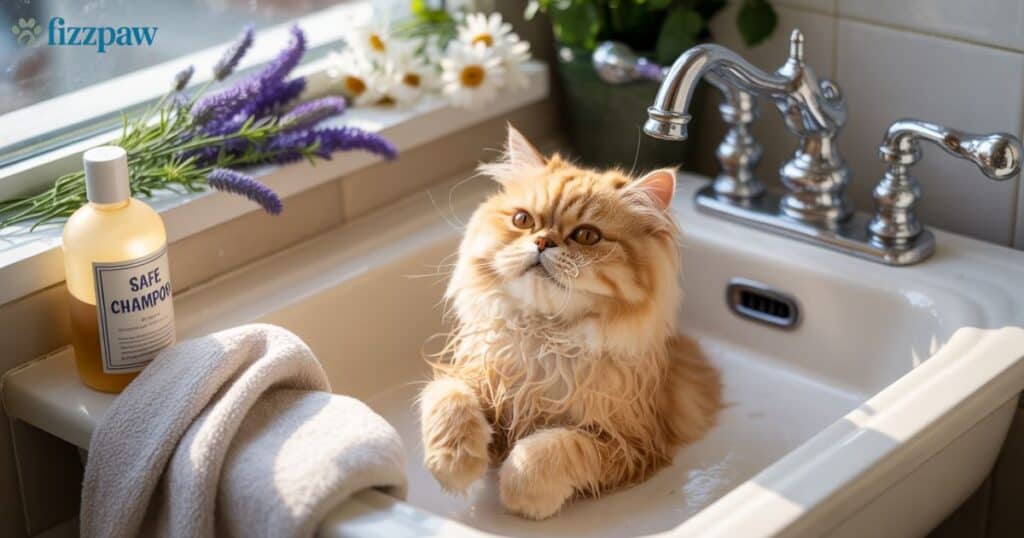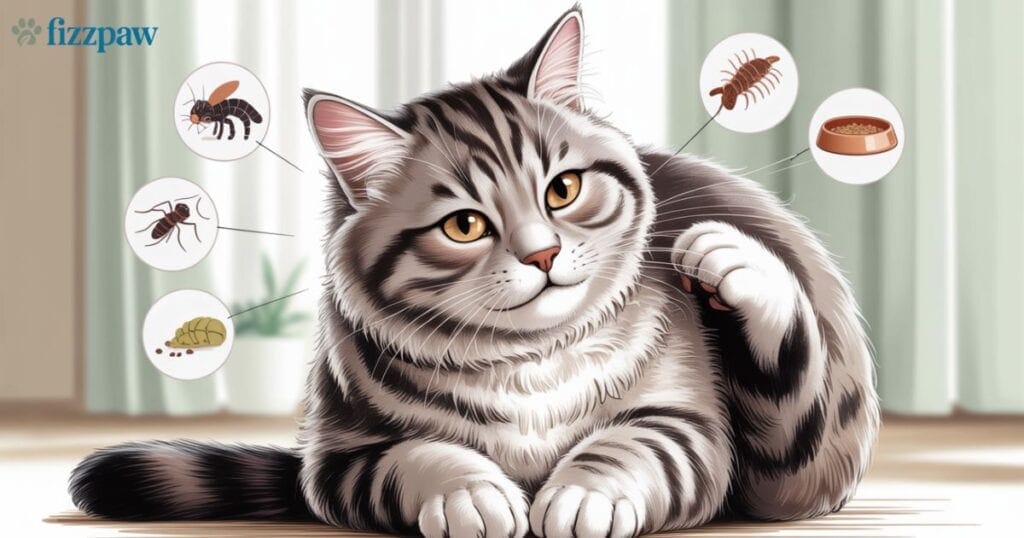Are your cats constantly biting, scratching, or licking your skin? It’s not only annoying, but it could be an indication of an underlying issue. If you’re thinking, how can I soothe my cat’s itchy skin, then you’re not alone. From dry skin in a cat’s skin to more severe problems such as flea allergy dermatitis, there are a myriad of possible causes. Many cat owners ask, how can I soothe my cat’s itchy skin without rushing to medications? Let’s explore what really works.
The excessive scratching can cause open wounds, hot spots, and even hair loss in cats. The positive side? With the right treatment, you can make your cat feel better quickly. In this article, we’ll look at causes, signs, and natural remedies for cats that scratch, and the best time to contact your veterinarian for advice from an expert.
Why Is My Cat So Itchy? (Common & Overlooked Causes)
Cats scratch for various reasons. However, the frequency of scratching or biting indicates that something more serious is happening. The most prevalent causes include parasites such as mites found in the fur of cats, and fungal or bacterial illnesses or food allergies in cats. Sometimes, an allergic reaction to allergens from the environment, like mold, pollen, or household cleaners, triggers skin inflammation.
But there are overlooked causes too. Stress-induced overgrooming, poor grooming routines, and reactions to chemicals in flea treatments can also result in cat skin irritation. Even a poor diet lacking omega-3 for cat skin can lead to dry skin on cats and bald spots on the cat’s coat.

Let’s look at the most frequent causes of itchy cat skin:
| Cause | Description |
| Parasites | Fleas, mites, and lice cause intense flea allergy dermatitis |
| Fungal Infections | Like ringworm or yeast infection in cats |
| Food allergies in cats | Protein triggers, often chicken or fish |
| Environmental allergens | Dust, grass, mold, and smoke |
| Stress | Triggers overgrooming, anxiety, and hair loss in cats |
| Dry skin on cats | Often seasonal, or from a poor diet |
| Contact irritants | Harsh cleaners, plastic, and perfumes |
Hidden Triggers of Itchiness
- Poor diet or nutrient deficiency
- Plastic food bowls (contact dermatitis)
- Low humidity causes dry skin
- Allergy-friendly cat litter not used
- Exposure to new shampoos or sprays
Understanding the root causes is the first step in answering how can I soothe my cat’s itchy skin effectively.
Signs Your Cat’s Itching Needs Vet Attention
If you’ve tried everything and still wonder how can I soothe my cat’s itchy skin, it’s time to involve a vet for expert care. If your cat is always scratching or gnashing its skin, especially if you notice spots of hairless skin on your cat, there is a good chance that it’s time to consult your vet. Other signs to watch out for are open sores, scabs, or greasy spots on your skin. If you notice ear itchiness in cats, they might be shaking their heads or scratching at the base of their ears, which could indicate the presence of yeast infection in cats or mites.
A red flag is when scratching disrupts their sleep or they meow in distress. This could be a sign of feline atopic dermatitis or pruritus in cats, which requires professional intervention.
Watch for These Symptoms:
- Constant licking or chewing
- Hairballs from overgrooming
- Scabs or crusty skin (possible hot spots in cats)
- A bad smell may be a sign of a yeast infection in cats.
- Changes in appetite or mood
Natural Ways to Soothe Your Cat’s Itchy Skin at Home
For mild issues, natural remedies for itchy cats can offer quick relief. Try an oatmeal bath for cats, which naturally soothes inflammation and hydrates the skin. Use lukewarm water and unscented, plain oatmeal.
Coconut oil for cat skin is another effective remedy. Its antifungal effects can help relieve dryness and ease itching. Apply a small amount to the itchy area and monitor for improvement.
Other Home Remedies:
- Aloe vera (pure and pet-safe only)
- Herbal teas (like chamomile) dabbed on itchy skin
- Apple cider vinegar flea spray (diluted, never on open wounds)
- CBD for cats (to calm anxiety and reduce overgrooming)
Vet Treatments for Itchy Cats (What To Expect)
When you visit the vet, they’ll start with a vet diagnosis for itchy cat using tools like a skin scraping test to detect mites in cat fur, or a fungal culture for ringworm in cats. Blood work may also be ordered to check for internal issues.
Treatment depends on the cause. For allergies, vets may suggest antihistamines for cats, prescription cat treatments, or corticosteroids. For infections, topical medications for cats or oral antibiotics may be prescribed.
| Common Vet Treatments | Use Case |
| Corticosteroids | Severe inflammation or allergies |
| Antibiotics | Secondary infections |
| Antifungals | Fungal infections like ringworm |
| Medicated safe cat shampoo | Skin cleaning & soothing |
Skin-Soothing Diet: Can Food Help?
Yes! A good diet is essential in managing itchy cat causes and remedies. Food allergies in cats may need to go on a diet elimination trial. This means giving your cat hypoallergenic or hydrolyzed protein food for 8 to 12 weeks.
Look for ingredients like omega-3 for cat skin, zinc, Vitamin E, and limited fillers. These nutrients help reduce inflammation, promote healing, and improve coat health.
Top Ingredients to Look For:
- Hypoallergenic cat food (no soy, dairy, or chicken)
- Salmon or fish oils
- Probiotics
- No artificial preservatives
Daily Skincare Tips to Prevent Future Itchiness
A healthy grooming routine is essential to preventing. Regular brushing eliminates dander, dirt, and excessive fur, particularly for cats with long hair. Only bathe when you need t,o using the safe cat shampoo.
Make sure the cat’s surroundings are clean. Vacuum regularly, wash bedding each week, clean frequently, and apply regular prevention for cat fleas. Be sure to rinse the litter box thoroughly and switch to allergy-friendly litter if irritation persists.
If you’re unsure which products are safe, check out our vet-approved guide: Can I Use Human Shampoo on Cats?
Environmental Allergens and Stress: Hidden Triggers

Sometimes, the problem isn’t on the skin, but in the surrounding environment. Indoor cat skin allergies may be caused by dust mites, mold, or cleaning products that smell. Environmental allergens that are seasonal, like pollen, can get into windows through the open.
Stress is a different cause that’s not often considered. The boredom of moving into a new home or getting pets can cause excessive grooming. Think about cat trees, window benches, and puzzle toys to help you keep your pet entertained.
Allergens don’t just cause itching—they can affect eyes and breathing too. Learn more about cats sneezing and watery eyes.
Tips to Reduce Allergens:
- Make use of HEPA filters throughout your home.
- Beware of synthetic scents and sprays
- Make sure to regularly clean the curtains and air vents
When to See a Vet: Timeline & Red Flags
Do not wait for too long. If your cat’s scratching continues for more than 7 days or if you observe bleeding, rough skin, or changes in behavior, contact the vet. If your cat experiences an abrupt outbreak or is showing symptoms of flea allergy dermatitis, and you need to schedule an appointment, do so immediately.
Also, any reaction involving swelling of the face, breathing issues, or sudden collapse is an emergency. Vets will likely do a diet elimination trial, fungal culture, or bloodwork to determine the root cause.
Timeline:
| Time Frame | Action |
| Day 1–3 | Try home remedies |
| Day 4–7 | Monitor closely; switch litter/shampoo |
| Week 2 | Visit the vet if no improvement |
| Anytime | Go to the vet if there’s bleeding, hair loss in cats, or lethargy |
Itchy Cat Care FAQs
How can I soothe my cat’s itchy skin fast?
Use coconut oil for cat skin, oatmeal baths, or ask your vet for antihistamines. Remove allergens from the environment.
What can I give my cat for itchy skin?
You can give omega-3 supplements, antihistamines for cats, or try natural remedies like coconut oil for cat skin—but always ask your vet first.
How do you treat a cat’s skin irritation?
Treat cat skin irritation by identifying the cause, using safe cat shampoo, and applying topical medications for cats as prescribed by your vet.
What stops cat scratch itching?
To stop the itch, use prescription cat treatments, CBD for cats, or try a gentle oatmeal bath for cats for soothing relief.
What oil is good for a cat’s itchy skin?
Coconut oil for cat skin is safe in small amounts and helps moisturize and soothe dry skin on cats naturally.
How do I stop my cat from scratching?
First, address the cause—like mites in cat fur or indoor cat skin allergies—then try calming tools like cone collars or vet-approved creams.
Final Thoughts:
The comfort of your cat is paramount. Itchy skin in cats isn’t an issue that’s minor; it could lead to hot spots on cats as well as skin infections and emotional stress. So, how can I soothe my cat’s itchy skin? Begin by determining the root of the problem – whether it’s due to mites in fur, allergic reactions to food in cats, allergens from the environment, or dry skin in cats. Use the right care method.
The remedies are all natural for itchy cats, like coconut oil for the cat’s skin and oatmeal baths for cats, as well as prescription treatments for cats and vet diagnoses for cat itching symptoms. There’s every solution that is within reach if you’re asking yourself. How can I soothe my cat’s itchy skin? Be aware that taking action early while staying up-to-date and cooperating with your vet could be the key to making sure your cat is free of itching, content, and healthy.
Sources & Expert Insight
American Veterinary Medical Association (AVMA)
Cornell University College of Veterinary Medicine
Dr. Jane Brunt, DVM, Founder of CATalyst Council:
“Itching in cats is never just an itch. Always dig deeper for the cause.”




